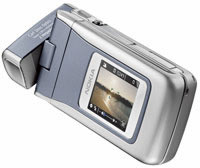 Nokia continues to be the Big Cheese of the worldwide mobile handset market, shipping nearly twice as many phones as its nearest competitor, Motorola.
Nokia continues to be the Big Cheese of the worldwide mobile handset market, shipping nearly twice as many phones as its nearest competitor, Motorola.
According to a report by IDC, Nokia shipped 53.8 million handsets in the first quarter of 2005, representing a chunky 30.9% share of the market.
Motorola lagged a fair way behind with 28.7 million shipments (16.5% of the market), followed by fast-rising Samsung, who had 24.5 million shipments and 14.1% of the market.
Nokia anticipates continued success and expects to shift 25 million smartphones in 2005 – twice as many as the 12 million it sold in 2004.
According to data from Canalys, it’s already off to a flying start, shipping almost 5.4 million smartphones in the traditionally slow first quarter, a triple fold increase from last year.
Overall, global shipments of smart mobile devices were up 82% year on year in Q1 2005, with Nokia grabbing half the market, followed by palmOne, RIM (Blackberry) and Fujitsu.
Phenomenal camera phone sales are also predicted by Nokia, which looks to ship 100 million camera phones and 40 million phones offering MP3 playback.
This would make Nokia the biggest camera and MP3 player sellers in the world, toppling Canon and Apple respectively off their thrones.
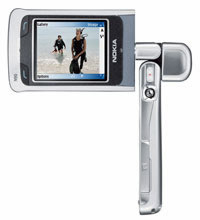 As we reported last week, Nokia has announced a range of high quality two-megapixel camera phones, making the phones an attractive alternative to a dedicated digital camera.
As we reported last week, Nokia has announced a range of high quality two-megapixel camera phones, making the phones an attractive alternative to a dedicated digital camera.
Similarly, their spanking new N91 phone has both a camera and an MP3 player built in, with a 4 gig hard drive rivalling standalone digital music players like the iPod mini.
The new phone is expected to come with a wallet draining price sting of around $800-$900 (~$422-£475 ~ €623-€700), although telecom carrier deals are expected to bring the price down to around $500 (~£264 ~€390) in the US.
Things are heating up in the handset industry, with the big players trying to out do each other on the feature lists.
Sony are about to release the W800, their first walkman phone, while Samsung is already offering camera phones offering higher resolution images than Nokia.
It’s not all going Nokia’s way though. In the US, Motorola remain the top dogs with a mobile market share of 31.7%, while Samsung overtook Nokia, grabbing 18.2% of the market compared with Nokia’s 14.6%. In fourth place was LG Electronics with a market share of 12.6%, with Kyocera in fifth at 5.2%.
 Real Networks is looking to up-end Apple’s iTunes store and nobble Napster To Go by launching a new music subscription services for portables music players.
Real Networks is looking to up-end Apple’s iTunes store and nobble Napster To Go by launching a new music subscription services for portables music players. Rhapsody 25 is the entry-level standard service which is completely free to use. It’s being supported by advertising, initially Chrysler and is designed to tempt people to subscribe. It allows anyone who downloads Rhapsody’s Windows-based jukebox software to listen to 25 songs for free each month from Rhapsody’s library, with the option to purchase and download songs a la carte. There will also be 25 ad-free radio stations available.
Rhapsody 25 is the entry-level standard service which is completely free to use. It’s being supported by advertising, initially Chrysler and is designed to tempt people to subscribe. It allows anyone who downloads Rhapsody’s Windows-based jukebox software to listen to 25 songs for free each month from Rhapsody’s library, with the option to purchase and download songs a la carte. There will also be 25 ad-free radio stations available. It’s been likened to having your CD collection on permanent hire purchase – once you lapse on your payments, you can kiss goodbye to your tunes. To old-school music fans, not owning your precious sounds is a bonkers proposition, but both Real and Napster believe there’s a market for subscription-based music downloads, with punters excited by the promise of filling an entire iPod for less than the price of two CDs.
It’s been likened to having your CD collection on permanent hire purchase – once you lapse on your payments, you can kiss goodbye to your tunes. To old-school music fans, not owning your precious sounds is a bonkers proposition, but both Real and Napster believe there’s a market for subscription-based music downloads, with punters excited by the promise of filling an entire iPod for less than the price of two CDs. Digital document software giants Adobe have announced that it will be buying up rivals Macromedia for about US$3.4 billion (£1.7bn/€2.6) in stock.
Digital document software giants Adobe have announced that it will be buying up rivals Macromedia for about US$3.4 billion (£1.7bn/€2.6) in stock.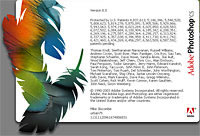 By combining the passion and creativity of two leading-edge companies, we will continue driving innovations that are changing the ways people everywhere are experiencing and interacting with information.”
By combining the passion and creativity of two leading-edge companies, we will continue driving innovations that are changing the ways people everywhere are experiencing and interacting with information.” Both products have large, loyal user bases and there may be some concern that – in the words of Sparks – “this town ain’t big enough for the both of us”.
Both products have large, loyal user bases and there may be some concern that – in the words of Sparks – “this town ain’t big enough for the both of us”. Last week, 250 executives from advertising agencies, game developers and publishers swarmed into the first annual Advertising in Games Forum on 14 April 2005 in New York City.
Last week, 250 executives from advertising agencies, game developers and publishers swarmed into the first annual Advertising in Games Forum on 14 April 2005 in New York City. For the benefit of buzzword-deficient execs, Yankee Group senior analyst Mike Goodman explained that this hideous word describes what you get when advertisers create a game around a product rather than place their brands within a well-known title.
For the benefit of buzzword-deficient execs, Yankee Group senior analyst Mike Goodman explained that this hideous word describes what you get when advertisers create a game around a product rather than place their brands within a well-known title. Fact-bloated attendees also learned that the top selling 2004 game titles (according to the NPD Group) were:
Fact-bloated attendees also learned that the top selling 2004 game titles (according to the NPD Group) were: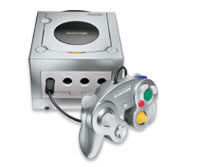 A study by Nielsen Entertainment has revealed that men spend more money on video games than they do on music, adding weight to a growing belief that video games are displacing other forms of media for the notoriously fickle attentions of young men.
A study by Nielsen Entertainment has revealed that men spend more money on video games than they do on music, adding weight to a growing belief that video games are displacing other forms of media for the notoriously fickle attentions of young men. Naturally, advertisers are keen to cash in on the rising popularity of games, and are looking at ever more persuasive ways to bombard bedroom-bound, bunglesome boys with beguiling adverts (branded billboards in race games are already commonplace, as we’ve
Naturally, advertisers are keen to cash in on the rising popularity of games, and are looking at ever more persuasive ways to bombard bedroom-bound, bunglesome boys with beguiling adverts (branded billboards in race games are already commonplace, as we’ve  Overall, Nielsen reported that active gamers tend to spend just over 5 hours a week playing alone and 3 hours a week playing with people or online.
Overall, Nielsen reported that active gamers tend to spend just over 5 hours a week playing alone and 3 hours a week playing with people or online. Online retail giant Amazon.com has scooped up the ‘printing fulfillment’ company BookSurge, which maintains a catalogue of thousands of book titles available for users to print on demand.
Online retail giant Amazon.com has scooped up the ‘printing fulfillment’ company BookSurge, which maintains a catalogue of thousands of book titles available for users to print on demand. The company will now offer (cue: North American accent) “inventory-free book fulfillment” to publishers through BookSurge Publisher Services and to authors through BookSurge Publishing.
The company will now offer (cue: North American accent) “inventory-free book fulfillment” to publishers through BookSurge Publisher Services and to authors through BookSurge Publishing. In a break with cinema-tradition, HDNet Movies viewers will be able to see Alex Gibney’s highly acclaimed documentary “Enron: The Smartest Guys in the Room” on the very same day the movie premieres in US theatres.
In a break with cinema-tradition, HDNet Movies viewers will be able to see Alex Gibney’s highly acclaimed documentary “Enron: The Smartest Guys in the Room” on the very same day the movie premieres in US theatres. Thrill-seeking mobile phone users around the world slapped out US$400 million on pornographic pictures and video in 2004 – an amount that is expected to rise to US$5 billion by 2010, according to a report by research group Strategy Analytics.
Thrill-seeking mobile phone users around the world slapped out US$400 million on pornographic pictures and video in 2004 – an amount that is expected to rise to US$5 billion by 2010, according to a report by research group Strategy Analytics. The US$5 billion forecast for 2010 represents a huge upward shift from Strategy Analytics’ earlier predictions, with the company noting that adult entertainment businesses are aggressively building services and customers appear happy to shell out for them.
The US$5 billion forecast for 2010 represents a huge upward shift from Strategy Analytics’ earlier predictions, with the company noting that adult entertainment businesses are aggressively building services and customers appear happy to shell out for them. A US appeals panel has challenged new federal rules which require certain video devices to incorporate technology designed to prevent copying digital television programs and distributing them over the Internet.
A US appeals panel has challenged new federal rules which require certain video devices to incorporate technology designed to prevent copying digital television programs and distributing them over the Internet. We may not win many things these days, but when it comes to downloading pirated television, us Brits can puff out our chests and proudly declare, “we’re number one!”
We may not win many things these days, but when it comes to downloading pirated television, us Brits can puff out our chests and proudly declare, “we’re number one!”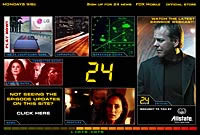 The downloading frenzy has been driven by the consumer-annoying practice of releasing popular US TV shows such as “The West Wing,” “The Sopranos” and “Friends” months after they’ve been seen by our American cousins.
The downloading frenzy has been driven by the consumer-annoying practice of releasing popular US TV shows such as “The West Wing,” “The Sopranos” and “Friends” months after they’ve been seen by our American cousins.